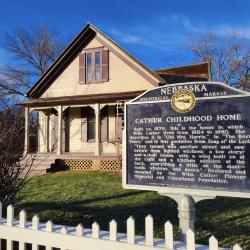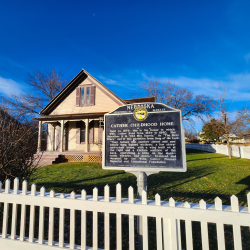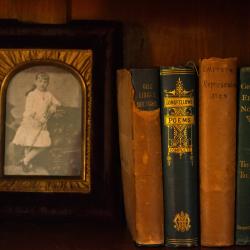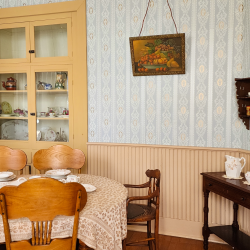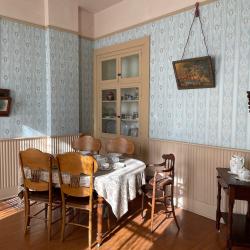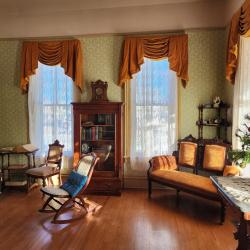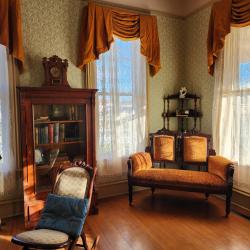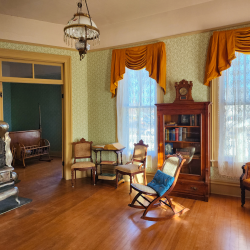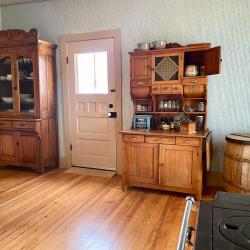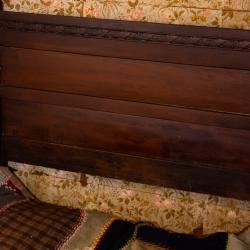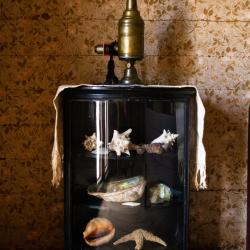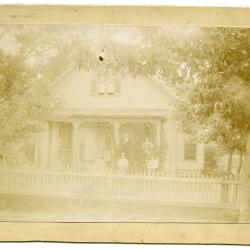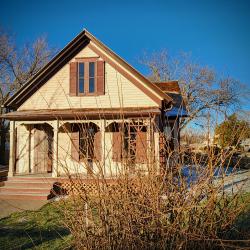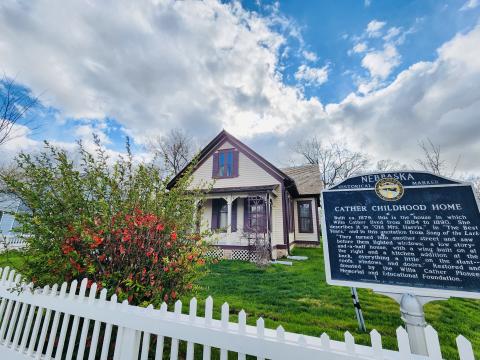
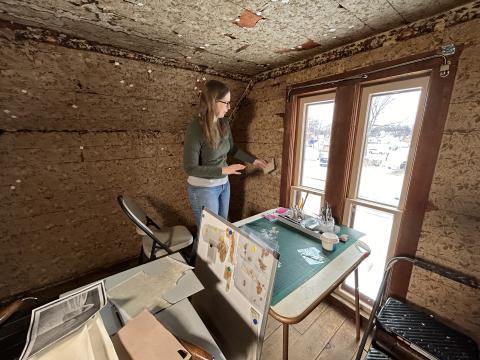
Restored Willa Cather Childhood Home Reopens
Book tours online ahead of your visit! Click here to learn about historic site tour options.
After an extensive sixteen-month restoration, the Willa Cather Childhood Home reopened for tours on December 7, the Pulitzer Prize-winning author’s 150th birthday. The site closed on August 15, 2022 to facilitate the first comprehensive restoration in more than fifty years.
A modest one-and-a-half story frame house, the Willa Cather Childhood Home was Cather’s residence between the ages of ten to sixteen. It is designated a National Historic Landmark, part of the largest grouping of preserved historic sites and landscapes related to any other American writer. While Cather moved away from Nebraska in 1896, her parents Charles and Mary Virginia Cather rented the home through 1904. Many of Cather’s books depict life in Red Cloud and Webster County during the author’s formative years. The Cather house is vividly described in Cather's novel, The Song of the Lark, and short stories, “Old Mrs. Harris,” and “The Best Years.”
The extensive restoration project provided an accessible walkway and entrance; electrical service and non-intrusive museum lighting for enhanced interpretation; a climate control system and a new roof and foundation. Enclosure of the attic space and extensive repairs to the windows and doors sealed the building envelope, which will limit exposure to the elements and ensure an improved environment for collections. The exterior was repainted in the familiar brown-toned historic palette, reconfirmed after a careful paint analysis.
The next phase of the restoration is conservation of the original wallpaper in Willa Cather’s attic bedroom, planned to begin in the spring of 2024. Cleaning, assessments, and testing were carried out in 2019 and 2022 by paper conservators from the Ford Conservation Center in Omaha, Nebraska.
The project was supported by the State of Nebraska – Department of Economic Development and the Willa Cather Foundation, as a grant recipient of state funds. A Save America’s Treasures grant administered by the National Park Service was matched dollar-for-dollar through a private fundraising effort as part of the Center’s Campaign for the Future, which raised more than $7 million for restoration of numerous Cather-related historic properties, expansion of educational programming and exhibits, development of visitor amenities, and an endowment for preservation and collections care.
Former First Lady of the United States, Mrs. Laura Bush served as the Honorary National Chair for the campaign’s public fundraising effort. Mrs. Bush, who also dedicated the National Willa Cather Center in 2017, stated, “Through Willa Cather’s writing, we have a better understanding of one of the most remarkable and compelling periods in American history.” She referred to the sites and collections in Red Cloud “cultural treasures.”
The transformative restoration has ensured that the 140+-year-old home will be preserved as a cultural attraction for the learning and the enjoyment of future generations. “This restoration is an undertaking we’ve dreamt about for more than a decade,” said National Willa Cather Center Executive Director Ashley Olson. “We are excited for visitors to see the changes and encounter family objects in an enhanced, accessible, and reinterpreted space.”
Next Step: Wallpaper Conservation
The original wallpaper in Cather’s attic bedroom is a late nineteenth century floral pattern that she selected. Applied directly to the acidic wooden boards beneath, decades of light infiltration and environmental instability have taken a toll on the wallpaper. Conservation work will resume in March of 2024. Guests who book a tour in the early weeks of that month will have an opportunity to see paper conservators at work in the space.
The attic bedroom was the space partitioned off solely for Cather as the eldest of seven siblings. The simple room with board walls and sloping ceilings was for a few pivotal years in a small and busy household of nine, the solitary space needed for her brilliant young mind to imagine the whole world. Cather later referred to it as her “rose-bower,” and she occupied the same kind of cozy room at the Shattuck Inn in Jaffrey and in the study of the cottage that she owned with Edith Lewis at Grand Manan.
She would later write the bedroom description into The Song of the Lark (1915): “The ceiling was so low that a grown person could reach it with the palm of the hand, and it sloped down on either side. There was only one window, but it was a double one and went to the floor. In October, while the days were still warm, Thea and Tillie papered the room, walls and ceiling in the same paper, small red and brown roses on a yellowish ground.”
Celebrating 150 Years of Willa Cather
Perhaps best known for her novels My Ántonia, O Pioneers! and Death Comes for the Archbishop, Willa Cather has become known as one of America’s canonical authors. The town of Red Cloud and its prairie landscapes were settings in some of Cather’s most popular writings, including her Pultizer Prize-winning novel One of Ours. Cather and her family moved to Nebraska from Virginia in 1883. Her final novel, Sapphira and the Slave Girl is set in the Shenandoah Valley of her early childhood.
Events took place across the country throughout 2023-2024 to honor and celebrate Willa Cather’s sesquicentennial and to expand awareness of her life and literature. A highlight was the unveiling of artist Littleton Alston’s Cather statue in National Statuary Hall at the U.S. Capitol on June 7. Additional events took place in California, Massachusetts, New Hampshire, Nebraska, New York, Pennsylvania, and Virginia.
On December 7, Cather’s 150th birthday will be fêted with guided holiday tours—including of the Childhood Home—and a live streamed virtual book launch and reading of Benjamin Taylor’s Chasing Bright Medusas: A Life of Willa Cather (at 7:00 p.m. CT). Birthday cupcakes will be served throughout the day, and the National Willa Cather Bookstore will have an extensive offering of gifts and books at 15% off. Visitors on tour in December will also be able to view the new permanent exhibit, Making a Place: A Long History of Red Cloud, before it officially opens to the public in the historic Farmers and Merchants Bank.
Cather 150 Campaign
Furthering celebrations in this sesquicentennial year, the Cather 150 Campaign is an initiative of the Willa Cather Foundation to raise an additional $150,000 for preservation and educational programs. A challenge gift of $50,000 has been offered if $100,000 can be raised by December 31. Documentarian Ken Burns, an avowed Willa Cather fan and Foundation supporter, has lent his voice to the cause. Burns remarked that gifts to the Cather 150 initiative “will help the National Willa Cather Center provide classroom resources for teachers, preserve historic sites associated with Cather's life and work, conserve the Willa Cather Memorial Prairie, care for priceless collections, and allow a living memorial to operate for the benefit of generations to come.”
Donations may be made at willacather.org/donate or by sending to the National Willa Cather Center, 413 N. Webster Street, Red Cloud, NE 68970

Thank You!
This project is supported by the State of Nebraska - Department of Economic Development, and a Save America’s Treasures (SAT) grant administered by the National Park Service. The NPS, in partnership with the Institute of Museum and Library Services (IMLS), the National Endowment for the Arts (NEA), and the National Endowment for the Humanities (NEH), award these matching grants to support the preservation of nationally significant historic properties and collections. The SAT grant uses revenue from federal oil leases for preservation and conservation projects without expending tax dollars and requires a dollar-for-dollar match in non-federal donations.
Thank you also to BVH Architecture, Tru-Built Construction, Len Schamber of Schamber Historic Preservation, Brent D. Glass LLC, and all consultants and subcontractors who worked on the project. Among others, we’re also grateful to the John K. & Lynne D. Boyer Family Foundation, Anne Thorne Weaver Foundation, Holland Foundation, and an anonymous supporter for their gifts to the restoration effort.

